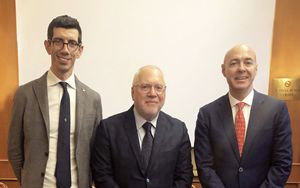(Finance) – “The Reform of Tax Justice represents a fundamental step for the system even if it still highlights a series of critical issues”. He said it Enrico Manzon, councilor of the Court of Cassationspeaking at the round table promoted by the National Union of Young Chartered Accountants and Accounting Experts, chaired by Matteo De Lise, which took place in the conference room of the Hotel Nazionale in Rome.
“The Court of Cassation is a common good. The certainty of the law must be preserved, which is a fundamental institutional resource, especially in the tax field. A procedural institution – added the councilor Manzon – in which I strongly believe and which has been criticized is the reference for a preliminary ruling. The standard was ‘copied’ by the French and also arrived in Italy. Because, for example, in this year’s budget law the facilitated definition has been expanded and new institutions have been introduced which must be implemented: post-appeal conciliation and the waiver of appeal. Then, there is a constitutional provision (article 111, paragraph 7) which provides for the possibility of appealing to the Supreme Court against sentences, in accordance with the law. In this sense we cannot do anything different. Putting together the reference for a preliminary ruling and a more precise jurisprudence in terms of the burden of proof, especially the pre-trial definition, placing it in the hands of a professional judge also improves the quality of the sentences. For three years in a row, the president of the ‘Court’, in his inaugural report, pointed out that the percentage of annulments of sentences in the Tax Court of Appeal is double compared to the average of the ordinary civil Courts of Appeal. This set of measures should lead to the restriction of access to the top of the jurisdiction and, therefore, to obtain the result of a reformed and better tax justice also in the management of trials. For this reason – concludes the magistrate – I am not entirely pessimistic”.
“Six months after the reform of the tax process came into force – he said Federico Giotti, of the executive council of Ungdcec – one can speak of positive aspects, but some ‘tuning’ is needed. The positive aspect is the introduction of the figure of the professional tax judge, with the fifth special judiciary, therefore, greater professionalism of the judge, even if it depends on the Ministry of Economy and Finance, one of the parties in the case. I believe that the latter should be amended. Similarly, the institution of mediation must be remodeled and managed by a third party. Other positive aspects are the introduction of the burden of proof in the tax process. Even if in practice it will be necessary to verify in the field what consequences it will have in the process. Another positive aspect – Giotti remarked – is the introduction of testimonial evidence, with the admissibility of the same evidence also on the basis of third party declarations. And the possibility to fight back during the trial. The acts must be strengthened by strengthening the adversarial process for all types of judgment and it is necessary to rebalance the system of presumptions to avoid imbalance between the parties”.
“The tax issue in Italy is particularly felt, especially by citizens, this justice – he highlighted Marco Greggio, lawyer and corporate jurist of the Court of Padua – evidently it hits a raw nerve in Italy and fits into a line of reforms, most recently that of the corporate crisis which sometimes also serves to simplify the process of justice. The critical points of this new reform were highlighted during the work. Just read the data of 2017, where the bankruptcies pending in the Milan court had a liability of 25 billion euros. Of which about 38% of tax debt and 20% of payables to suppliers. At the national level, bankruptcies lead to a tax liability of 160 billion euros. Of these, the Revenue Agency reports a satisfaction of just 1.61%. A first positive aspect of the tax reform is the referral by the Supreme Court to the Regional Tax Commission with the reduction of the rate to 90%, which must be further reduced. The second positive note is a general draw, in case of victory in the first and second degree. And finally also the implementation of the staff of magistrates. I note, however, that in recent years litigation, following the reforms not only of taxation, has decreased and today some courts are almost empty. Probably – observed Greggio – the motivation is for the costs of justice or also for the distrust of citizens towards justice, alas, in any case the dispute has certainly decreased. It is obvious that these reforms are all in this trend, deflating litigation, decreasing it and finding fiscal peace in the tax area, this is a hope that we all expect”.
The meeting was realized with the contribution of Ciro Di Pietro (chief restructuring) and of the lawyers Danilo D’Andrea, Francesco De Luca, Amedeo Di Pietro (cassation lawyer) and Elsa Gentile.
